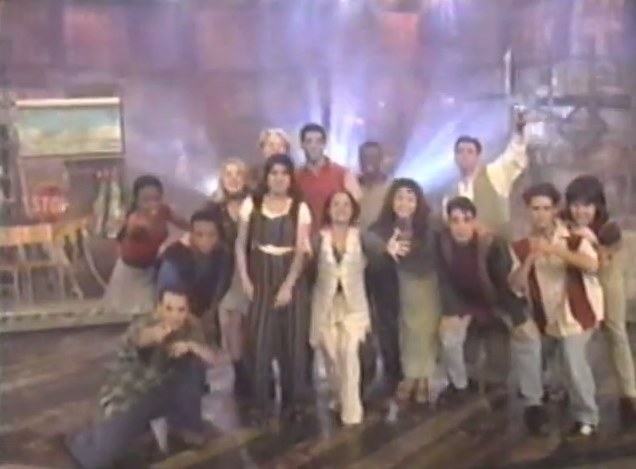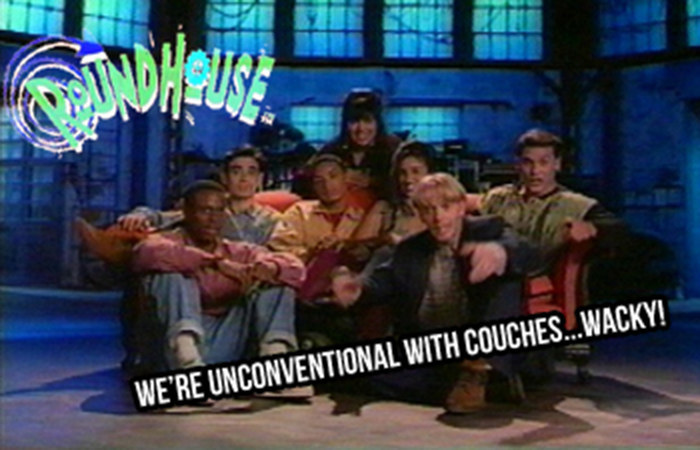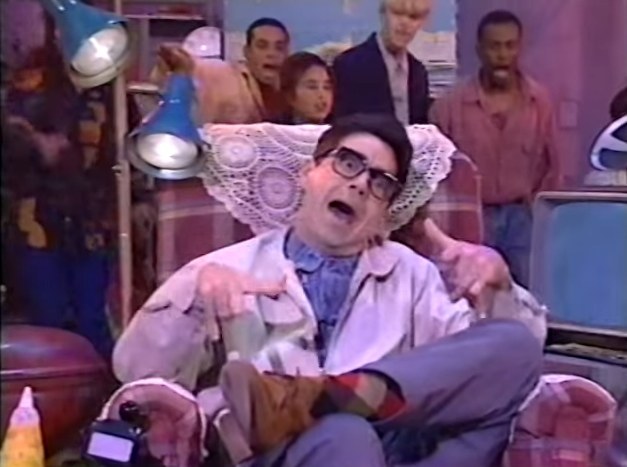
The date was August 15, 1992. The BuzzFeed staff were either sucking their thumbs, playing Super Mario on their Game Boys, or listening to Nirvana on their Walkmans. Nickelodeon had just launched its SNICK block of programming, which included three original Nick shows and one new debut. The three originals were already fan favorites: "Clarissa Explains It All" captured the Melissa Joan Hart fans, "Are You Afraid Of The Dark?" grabbed future X-Files viewers, and "The Ren & Stimpy Show" grabbed just about everyone else.
But what about that new debut? That new show was called "Roundhouse". It was to be unlike anything any network had ever aired on television.
Roundhouse set out to discuss social issues affecting young people through sketch comedy, song, and dance. The cast was diverse with regards to race and gender. And while the sketches and songs seemed as innocent as anything on the Disney Channel, the satire was sophisticated and cerebral enough to stick it to society. (In fact, no other children's show had thrown such shade before Roundhouse. The show lampooned everyone and everything, including their own cancellation.)
Roundhouse entertained young audiences for four seasons before bowing out on Christmas Eve 1996. By then, All That had taken the reins as Nickelodeon's premier sketch comedy show. But the influence of Roundhouse on its viewers had set in, and its positivity and joyfulness would linger in the memory of its audience for years to come.
But for those viewers who have forgotten, or for those who weren't even born to see the beauty of SNICK's first sketchy comedy show, let's all take a drive down the Easychair Expressway and find out what other shows on TV today could learn from Roundhouse.
1. Punch up, never down.

Roundhouse tackled plenty of issues throughout its four-season run, including bigotry, feminism, and bullying. But it never made the victim the butt of the joke, and it never tried to get cheap laughs. Instead, it dared to attack the oppressors. It used silliness to ease the awkwardness of discussing tough topics. And at times, it even made fun of itself, its directors, and its prime financial sponsors. Roundhouse dared to be independent; but most of all, it dared to be kind.
Many shows on television now think it's okay to throw a slurry of insults into the script and call that "comedy". (Here's looking at you, anything on TV written by Chuck Lorre.) But Roundhouse knew that good laughs didn't come from being nasty. Good laughs came from taking the piss out of people in power. Good laughs came from reflecting everyday snippets of life. Good laughs and reactions came from pure positivity and sympathy with the Anyfamily. Roundhouse knew this, and so instead of using their 22 minutes on air to phone it in, they used them to spread good vibes and stick it to The Man.
2. Representation is key.

Nickelodeon in the 1990s was moderately progressive with regards to representation. Their programming worked hard to cater to kids, regardless of race, religion, or gender. Roundhouse was no exception. Their talented cast showed that no matter who you were, if you wanted to be somebody, you could be somebody if you really tried. It was not the first Nickelodeon show to send this message, but it was certainly the first kids' show of its kind to do so.
Representation isn't a hard issue to solve, but not many kids' shows on TV right now have a fully representative cast. Roundhouse wasn't trying to make a bold statement by having a diverse cast; it was just doing what was right. Nowadays, it would be a big to-do. Sure, it's a big to-do, but only because it's what shows should be doing in the first place!
The point of Roundhouse and Nickelodeon in the '90s as a whole was this: As long as you're a good person and spread positivity in life, you can be free to be yourself.
3. Honesty is a great policy.

Here's a given piece of advice. Kids' shows are meant to take the moral high ground. They're supposed to teach kids lessons so that they grow up to be stalwart members of society. But they're also supposed to be fun, entertain, and spark a child's imagination, so that the kid doesn't grow up to be another boring old meat puppet in a suit. (Again, this is a given. Even Sesame Street knew that.)
Roundhouse was honest to the point of being meta. The cast and writers were open about the big issues and weren't afraid to tackle them with song, dance, and metaphors. They even used themselves as the butt of the joke from time to time. They did these things because they knew that in order to connect with their audience, they had to play it real. Anything else would come off as phony and insincere. Roundhouse's cast never tried to be anything more than what they were: A bunch of talented, smart, and awesome individuals having a good time and spreading fun and joy through the power of television.
Most of this kind of programming is online now, which is one of the reasons why more young viewers are tuning into Youtube and away from the TV. But even in this digital age, having a TV show is still a big deal, and having millions of TV viewers can seem huge compared to having a million hits on Youtube. (Just look at indie animations such as Steven Universe or Bee and Puppycat.) If kids' TV programs kept it real and treated their young audiences as smart human beings rather than -- well -- babies, maybe more eyes would turn back to television. Maybe.
BONUS: There's the Dad who rides around in a motorized recliner. No, really.

Roundhouse now only exists in low-quality online videos, limited DVD releases, and dusty VHS tapes in your mom's attic. But the lessons that it taught thousands of young viewers in the early '90s will live on forever. Whether or not those lessons have any influence on the kids' TV shows of today or tomorrow is up to us.
"Reprise the theme song and roll the credits!"

